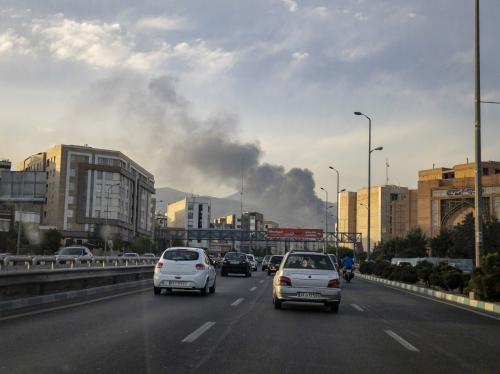The election of Iran’s former nuclear negotiator, Hassan Rouhani, to its presidency last month has sparked a torrent of analysis within Iran, as well as in capitals such as Washington where policy toward Tehran remains an urgent arena for debate. Much of the post-election commentary has centered on the prospects for breaking the stalemate between Iran and the international community over the nuclear issue, probing the implications of the Rouhani victory on Iran’s approach toward the next, as-yet-unscheduled round of talks with world powers.
However, as important as the political opening in Iran appears to be, Iran’s internal context is hardly the only variable in the perpetually intractable nuclear equation. Washington’s tactics and approach will prove at least as decisive in shaping the possibilities for progress at the negotiating table. And yet missing from the analytical response to the Rouhani victory has been a clear articulation of what the Obama Administration can do to capitalize on the leadership shifts within Tehran to advance more meaningful dialogue and, hopefully, a durable resolution to the profound international concerns about Iran’s nuclear issue.
Until now. One of our newest colleagues at Brookings, former senior State Department official Robert Einhorn, has just published a must-read piece in Foreign Policy, “Getting To Yes With Iran,” which lays the opportunity and the challenge before the administration as a result of Rouhani’s win, and offers a road map for U.S. officials in contemplating the next diplomatic steps. It’s a thoughtful piece, written by one of the few Americans who can claim longstanding, first-hand engagement with the technical and diplomatic aspects of Iran’s nuclear ambitions.
Einhorn’s case is well worth reading in its entirety here at Foreign Policy.com, but I wanted to highlight just a few of its important dimensions. First, it’s significant that a recent member of the U.S. negotiating team immediately appreciates the significance of the campaign discussion surrounding the nuclear issue and Rouhani’s election. In contrast to those who have derided the election as a meaningless sham, Einhorn outlines the importance of Rouhani’s ascendance at this precarious moment, contending:
“we shouldn’t underestimate Rouhani’s role. He will be a player on the nuclear issue, much more than Ahmadinejad ever was, not just because of his personal experience as a nuclear negotiator or his mandate from the Iranian electorate, but also because it is now clear that he has allies within the Iranian leadership who support his desire to end the impasse. The supreme leader will continue to be heavily influenced by the Iranian Revolutionary Guard Corps and other opponents of compromise. But he and his close advisors will also have to pay attention to Rouhani.”
Second, Einhorn is not content to rest on whatever laurels Washington and its allies can claim in having precipitated, through the severe sanctions regime, at least some of the conditions that facilitated Rouhani’s surprising win. Unlike those who have embraced Rouhani’s victory to advocate for more of the same in terms of U.S. policy, Einhorn urges his former colleagues to review the current diplomatic strategy, and consider how Washington can adjust its approach to capitalize upon whatever opening the election may have generated. He offers a series of proposals around the tough issues, including Iran’s much ballyhooed ‘right to enrichment’ and whether the U.S. should go big in seeking a comprehensive nuclear deal or proffer smaller-bore confidence-building gestures with Tehran.
Finally, though Einhorn’s arguments are always grounded in sober realism, there is an underlying hint of optimism here, as he argues that it “should be possible to reconcile Iran’s stated interest in pursuing enrichment to support its civil nuclear energy plans (which for the foreseeable future are modest in scale) with the international community’s interest in ensuring that Iran does not have a readily available nuclear weapons breakout capability.” In other words, someone who has recently sat across the table from Iran’s negotiating team is convinced that a mutually tolerable bargain, that meets both sides’ minimum requirements, can be achieved. In the world of Iran policy, that qualifies as rare and welcome good news.
There should be no illusions— the decades of estrangement, the deeply-rooted and perfectly justifiable suspicions of both sides, the contradictory objectives, and the contentious domestic politics in both Washington and Tehran underscore that it will not be easy to reach such a deal. If the Obama Administration hopes to make good on its pledge to prevent Iran from acquiring a nuclear weapon without embarking upon a third Middle Eastern war, the game plan that Robert Einhorn outlines represents an excellent starting point.
The Brookings Institution is committed to quality, independence, and impact.
We are supported by a diverse array of funders. In line with our values and policies, each Brookings publication represents the sole views of its author(s).



Commentary
An Insider’s Advice On Next Steps For Nuclear Negotiations With Iran
July 10, 2013